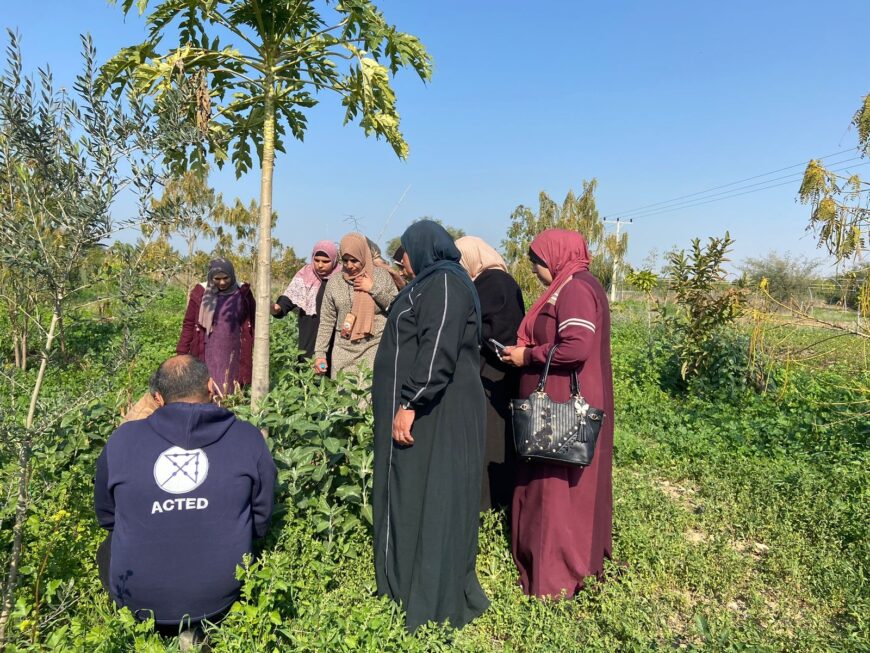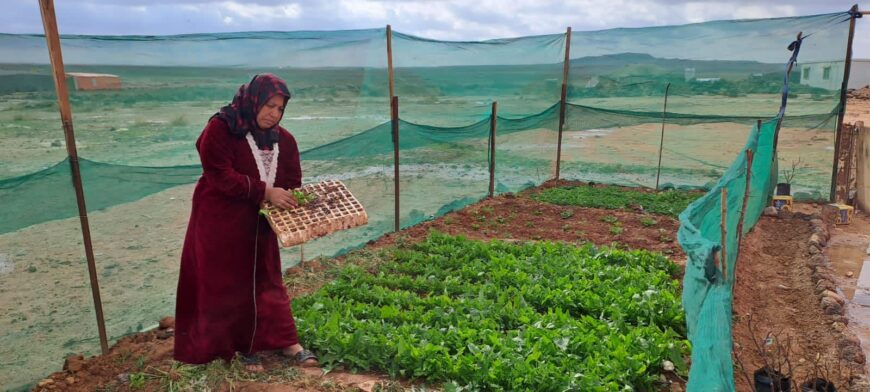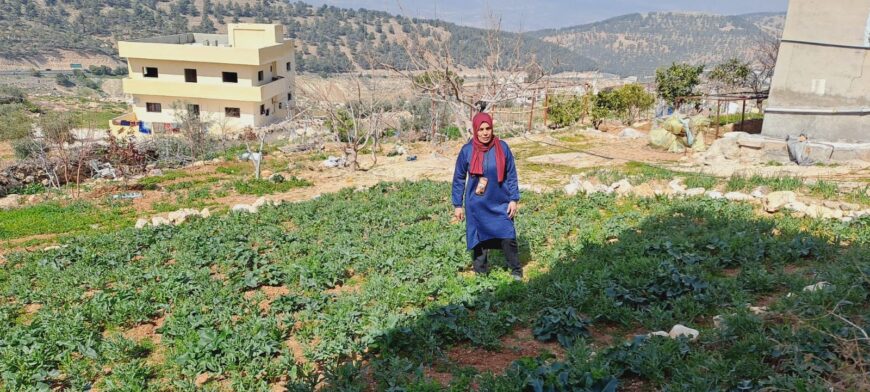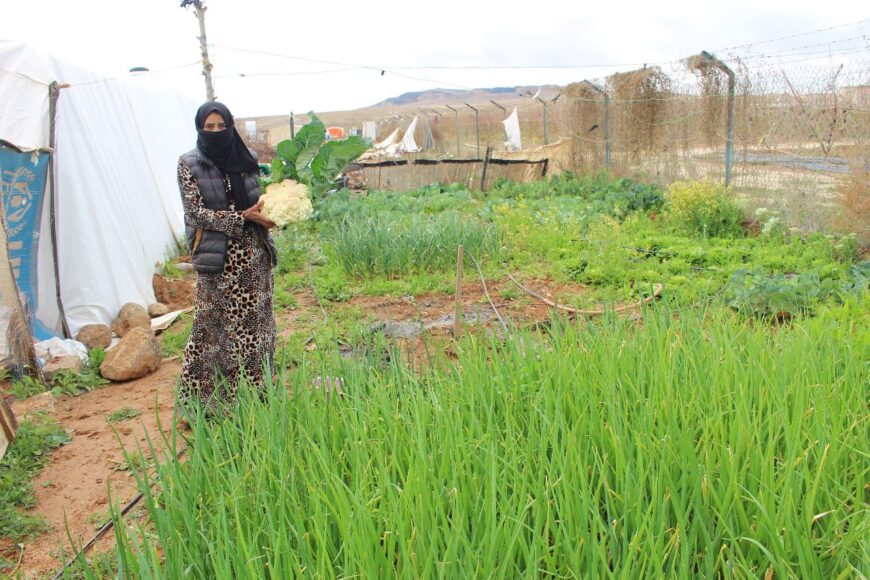On International Day of Rural Women, Acted seeks to highlight the important role that rural women hold in their communities. Beyond their integral contributions to sustaining livelihoods and nurturing their households and children, these women also serve as linchpins in the agriculture sector, ensuring food security for the whole community. Yet, they are the ones who suffer the most from discrimination and exclusion when it comes to accessing food resources. In Jordan, Acted is committed to empowering women living in remote rural areas by fostering the growth of their own agricultural businesses. This entails enhancing their access to resources and equipping them with the technical expertise to navigate the ongoing challenges posed by the climate crisis.
Women living in rural areas: a central yet often overlooked role
In the past years, it has been commonly acknowledged that women and people living in rural environments are disproportionately affected by hunger and food insecurity.[1] Women’s increased exposure to hunger is notably explained by systemic patriarchy, leading to discrimination in access to resources, markets, salary, credit, decision-making and land and livestock ownership, the UN recalls. On the other hand, family farms represent 90% of farms in the world, and produce 80% of the world’s food[2]. While men usually look for maximum profit via focus on lucrative crops or migration for seasonal work, rural women are the ones who cultivate the land to feed their households, care for small livestock and sell leftovers in local markets, hence feeding the whole community. Rural women are therefore not to be considered only as victims of food insecurity, but also as crucial actors in agriculture, safeguarding food security in their communities. FAO estimates, “If women in rural areas had the same access to agricultural assets, education and markets as men, agricultural production could be increased, and the number of hungry people reduced by 100-150 million.”[3]
The specificities of agriculture and fragile food security in Jordan
Agriculture in Jordan faces significant challenges, mainly due to the scarcity of water in the country, calling for technological innovation to avoid production and economic losses. However, if agricultural actors adapt to the specificities of the country, the sector is also a promising one for Jordan’s food production and economy. Indeed, Jordan imports 98% of consumable items from abroad, says the International Trade Organisation, yet an estimated 25% of the rural poor depend on agriculture as a source of income and the majority of Syrian refugees’ work permits issued are in this sector. Without adaptation measures and training of farmers, vulnerable micro and small-scale farmers remain constrained by lack of access to finance. This in turn causes lack of equipment and lower quality inputs, use of traditional rather than environmentally sustainable practices, and failure to be competitive in domestic and export markets due to unorganised production, unaligned with demand trends. In addition, farmers’ and daily wage labourers’ work is often seasonal, thus increasing their economic vulnerability due to the lack of year-round income sources, resulting in savings and loan dependency. Here again, these challenges are felt more critically by women workers.
Supporting rural women, both vulnerable Jordanians and Syrians refugees, to run sustainable businesses in agriculture

Acted’s project “Support Economic Growth and Sustainable, Diversified Income Creation in Jordan”, funded by BPRM, currently in its second year of implementation, relies on Acted’s expertise and knowledge of the Jordanian environment to promote sustainable livelihoods of vulnerable Jordanian and Syrian households. Acted supports 6,250 beneficiaries, out of which approximately 66% are women, with trainings, mentoring, and grant provision, notably in permaculture, food processing and craftmanship. Acted provides them with basic trainings in perma-garden, followed by advanced workshops, counselling on the drafting of a business plan, as well as the seed grants to implement their validated business plan. The advanced technical trainings include permaculture principles, methodology and designs, water, plants and soil management, soil rehabilitation, erosion control, composting and waste management, ecological control, grafting, fertilisation, seeding, and livestock.
Ensuring women’s inclusion in agriculture in Jordan
Throughout this project, Acted conducted 34 awareness sessions on decent labour conditions for 595 daily agricultural workers, 57% of whom are women. They receive advanced technical trainings on innovative and sustainable agricultural practices and participate in networking events to promote agro-businesses, support services and strengthen market linkages. Acted also provides trainings to agro-CSOs which in turn support daily agricultural workers through cascading technical trainings covering hydroponics, permaculture, transplantation, vaccination; and irrigation systems, hence adapted to Jordan’s specificities with regards to agriculture. As of now, with Acted’s oversight, the selected CSOs could develop their skills in writing successful business plans, enhancing their marketing skills, and managing their social enterprise projects. The combination of the awareness sessions and trainings supports rural women in creating their own agricultural businesses and gives them the keys to improve their working conditions if they work for someone else’s farm, reasserting their capability to work in the agricultural sector and increasing their independence.
[1] https://www.fao.org/3/cc6550en/cc6550en.pdf
[2] https://doi.org/10.1016/j.worlddev.2021.105455
[3] https://reliefweb.int/report/world/state-food-and-agriculture-2010-2011-women-agriculture-closing-gender-gap-development
This project gives rural vulnerable Jordanians and Syrians, in particular women, the keys to thriving as agricultural workers, informed about their labour rights, and trained on sustainable agricultural practices which in turn enable them to generate much-needed year-round income for themselves and their households. It contributes to bridging the gap in decision-making, land ownership, qualification, and salary between women and men workers, participating in increasing Jordan’s overall food production, employment, and economy.
Key figures
- Family farms represent 90% of farms in the world, and produce 80% of the world’s food
- If women in rural areas had the same access to agricultural assets, education and markets as men, agricultural production would increase and the number of hungry people reduced by 100-150 million people (FAO)
- After one year of the project, 95% of the selected farming households reported feeling an increased sense of safety and well-being (96% of the women).
- After one year of the project, 97% of the women having received perma-gardening grants reported increased agricultural production since the beginning of the programme.



